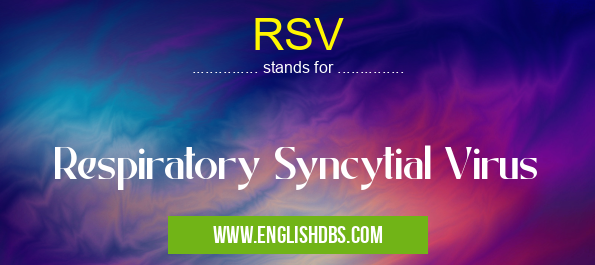What does RSV mean in PEDIATRIC
RSV, commonly known as Respiratory Syncytial Virus, is a common and potentially severe respiratory illness that affects individuals of all ages, particularly infants and young children. RSV is highly contagious and spreads easily through respiratory droplets released when an infected person coughs or sneezes. The virus primarily affects the lungs and airways, leading to a range of symptoms.

RSV meaning in Pediatric in Medical
RSV mostly used in an acronym Pediatric in Category Medical that means Respiratory Syncytial Virus
Shorthand: RSV,
Full Form: Respiratory Syncytial Virus
For more information of "Respiratory Syncytial Virus", see the section below.
Meaning in MEDICAL
In the context of medicine, RSV stands for Respiratory Syncytial Virus. It is a type of paramyxovirus that belongs to the family Pneumoviridae. RSV is the most common cause of lower respiratory tract infections in infants and young children worldwide.
Full Form
The full form of RSV is Respiratory Syncytial Virus.
What does RSV Stand for
RSV stands for Respiratory Syncytial Virus, a virus that causes respiratory infections.
Essential Questions and Answers on Respiratory Syncytial Virus in "MEDICAL»PEDIATRIC"
What is RSV?
Respiratory Syncytial Virus (RSV) is a common respiratory virus that can cause mild cold-like symptoms or severe respiratory illness, especially in infants and young children.
How does RSV spread?
RSV is spread through contact with respiratory droplets from an infected person, such as through coughing or sneezing. It can also be transmitted by touching objects or surfaces contaminated with the virus and then touching the face.
What are the symptoms of RSV?
Symptoms of RSV typically appear within 2-8 days after exposure to the virus and may include:
- Runny nose
- Fever
- Cough
- Wheezing
- Difficulty breathing
- Decreased appetite
- Irritability
How is RSV diagnosed?
RSV can be diagnosed through a physical exam and a history of symptoms. A healthcare professional may also order a nasal swab test to confirm the presence of the virus.
How is RSV treated?
There is no specific antiviral treatment for RSV. Treatment focuses on managing symptoms and supporting respiratory function. This may include:
- Rest and fluids
- Over-the-counter fever reducers and pain relievers
- Humidifier use
- Suctioning of mucus
- Oxygen therapy in severe cases
How can I prevent RSV?
The best way to prevent RSV is to practice good hand hygiene, such as frequent handwashing with soap and water. Other preventive measures include:
- Avoiding close contact with infected individuals
- Covering coughs and sneezes
- Cleaning and disinfecting frequently touched surfaces
- Getting vaccinated against RSV, if recommended
When should I seek medical attention for RSV?
Seek medical attention if you or your child experience any of the following symptoms:
- Difficulty breathing
- Persistent fever over 100.4°F (38°C)
- Wheezing
- Cyanosis (bluish discoloration of the skin, lips, or nail beds)
- Decreased appetite or fluid intake
- Lethargy or irritability
What is the prognosis for RSV?
Most cases of RSV resolve within a week or two. However, in some cases, RSV can lead to serious complications, such as bronchiolitis or pneumonia. Infants and young children are at the highest risk of severe complications.
Final Words: RSV is a ubiquitous and potentially serious respiratory virus that can cause a range of symptoms, especially in vulnerable populations such as infants and young children. Understanding the significance of RSV and its implications is crucial for healthcare professionals, caregivers, and individuals alike. Timely diagnosis and appropriate management are essential to mitigate the severity of RSV infections and prevent complications.
